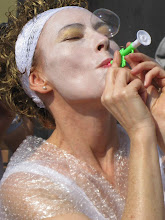
THE 3RD GWANGJU DESIGN BIENNALE OPENS IN SEPTEMBER
September 18 - November 4, 2009
Under the theme "The Clue", the Gwangju Design Biennale will open its 3rd edition on September 18th 2009 in the metropolitan city of Gwangju, South Korea. It is one of only a few design biennials in the world trying to create a tradition of thinking about design systematically.
The 3rd Gwangju Design Biennale sets out to reevaluate the truism "think globally and act locally" by examining five examples of traditional culture of Korea. These examples will be used to bring the potentialities of very specific local solutions to the fore and reconfigure them in an international design context: Perfect design is enacted in clothing, eating, living, enlightening and enjoying. Because these five human actions form the basis of a complete and harmonious life across all cultures, they are also themes in which designers, who want to improve that life, may search for clues. The extraordinary resources, objects and values upon which Korean culture thrives serve as a starting point for international designers and artists in their creation of new design concepts.
The five themes of 'Clothing', 'Eating', 'Living', 'Enlightening' and 'Enjoying' are expressed with the Korean words of '옷 [Ot]', '맛 [Mat]', '집Jip], '글 [Geul]' and '소리 [Sori]'. The curators of each theme exhibition try to pinpoint their relevance to specific culture and design. 'Clothing' is stratified into subjects: from the significance of traditional costume, to haute couture, to the garment as a work of art. Form uplifts function in 'Eating', where the symbolic color of food and the ceremonial table setting are reinterpreted. The organic spaces of the theme 'Living' offer elemental architectural inspiration. The themes 'Enlightening' and 'Enjoying' examine Korea's unprecedented specializations in the fields of graphic design and music. Each of the five themes will be filtered and interpreted through a set of responses by international artists and designers.
Three expanded projects cross section the five culturally located themes. 'Design to Save', 'Design to Care' and 'Design to Share,' proactively address major topics of global contemporary design such as sustainability, Universal Design and social engagement. Many of these projects utilize the citizens, economy and site of Gwangju with global enterprise. For Korea, the exhibition will be a venue in which to lay the groundwork for a new design culture, propelled, as the title suggests, by assets arising from the expanded meanings of traditional cultural manifestations.
The participating artists and designers of the Gwangju Design Biennale 2009 include among others German automobile designer Peter Schreyer, Japanese fashion designer Issey Miyake, Moshen Mostafavi, architect and Dean of the Harvard Graduate School of Design, or Korean filmmaker Kim Ki-duk.
Artistic director is Byungsoo Eun. Eun launched the design brand of VIUM in the US, Korea and Japan in 2001; he performed as a guest designer at Maison de Objet of France in 2004 and he curated Asia Design, the main exhibition of the first Gwangju Design Biennale in 2005. Under his direction 15 curators are responsible for the seven different sections of the biennale.
The first edition of Gwangju Design Biennale in 2005 was titled "Light into Life". 707 designers from 33 countries presented their works. The main exhibition was centered on Asian Design and Future Life, it was accompanied by seven special exhibitions, international conferences, workshops, festivals and performances. A total of 280,000 visitors came to see the Gwangju Design Biennale in 2005.
"L.I.G.H.T." was the title of the second edition in 2007. The main exhibition had five sub-categories: Life, Identity, Green, Human and Technology. 927 designers from 45 countries exhibited their works. The Gwangju Design Biennale in 2007 had 250,000 visitors.
The Gwangju Biennale, which started in September 1995, was Asia's first contemporary art biennale. The first edition was visited by 1.6 million people. More than 500 artists and performers from 60 countries took part in the first edition. Ever since, each edition of the biennale has been visited by more than half a million viewers and the event has grown to become the most influential, respected biennial in Asia and one of the most prominent biennials in the world.
The 8th Gwangju Biennale takes place from September 5 until November 10, 2010. Artistic Director is Italian-born Massimiliano Gioni.
More info see website: http://www.gwangju-biennale.org/?mid=sub_eng&mode=03&sub=01

No comments:
Post a Comment